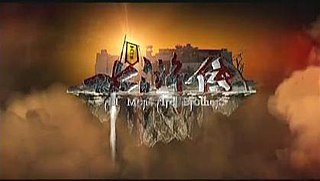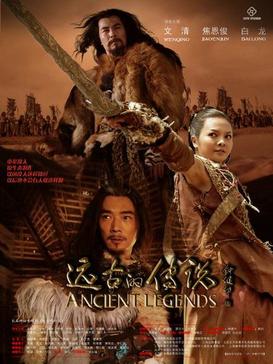Contents
This article has multiple issues. Please help improve it or discuss these issues on the talk page . (Learn how and when to remove these messages)
|
This is a list of Chinese volleyball players
This article has multiple issues. Please help improve it or discuss these issues on the talk page . (Learn how and when to remove these messages)
|
This is a list of Chinese volleyball players

Emperor Yuan of Jin, personal name Sima Rui (司馬睿), courtesy name Jingwen (景文), was an emperor of the Jin dynasty and the first emperor of the Eastern Jin. During the Upheaval of the Five Barbarians, he was stationed in Jiankang south of the Yangtze River where he avoided the chaos that befell northern China. Primarily through the help of the cousins, Wang Dun and Wang Dao, he emerged as an authority figure within the empire with the backing of the southern gentry clans and northern officials who fled to him for refuge. After Emperor Min of Jin was executed by the Han-Zhao dynasty in 318, he took the title of Emperor and made Jiankang his capital. Though at the time of his death he left the state under the heel of Wang Dun, the Eastern Jin dynasty as it became known lasted until its fall in July 420, contending with the so-called Sixteen Kingdoms in the north and occasionally in the southwest.

The People's Republic of China competed at the 1984 Summer Olympics in Los Angeles, United States. It was the first appearance at the Summer Games for the country after its mostly symbolic presence at the Summer Games in 1952 during which the dispute between the Republic of China and the PRC resulted in the former withdrawing all its athletes. After 1952 and until these games, the PRC boycotted the Olympics due to the Taiwan's presence as the Republic of China. In 1984, the Republic of China competed as Chinese Taipei and the PRC competed as China. Due to the then ongoing Sino-Soviet split, China did not participate in the Soviet-led boycott. In the previous games, China participated the United States-led boycott to protest the Soviet invasion of Afghanistan in 1979.

Shi Le, courtesy name Shilong, also known by his posthumous name as the Emperor Ming of Later Zhao, was the founding emperor of the Jie-led Later Zhao dynasty of China. He was initially sold as a slave by Western Jin officials, but after attaining freedom, he helped start a rebellion and eventually became a powerful general for the Xiongnu-led Han-Zhao dynasty, conquering most of northern China in Han-Zhao's name but holding the territory under his own control. In 319, after a dispute with the Han-Zhao emperor Liu Yao, he broke away from Han and formed his own state, Later Zhao. In 321, he defeated Duan Pidi, the last remaining Jin power in northern China besides Murong Hui, and in 329 he captured Liu Yao and conquered the Han-Zhao, adding western China to his empire as well. For the next 21 years, the Later Zhao would dominate northern China.

Romance of the Three Kingdoms is a Chinese television series adapted from the classical 14th century novel of the same title by Luo Guanzhong. The series was produced by China Central Television (CCTV) and was first aired on the network in 1994. It spanned a total of 84 episodes, each approximately 45 minutes long. One of the most expensive television series produced at the time, the project cost 170 million yuan. It was completed over four years and involved over 400,000 cast and crew members, including divisions of the People's Liberation Army from the Beijing, Nanjing and Chengdu military regions. Some of the dialogue spoken by characters was adapted directly from the novel. Extensive battle scenes, such as the battles of Guandu, Red Cliffs and Xiaoting, were also live-acted.
The Old History of the Five Dynasties was an official history mainly focusing on Five Dynasties era (907–960), which controlled much of northern China. And it also includes some history of other south states during the era. It was compiled by the Song dynasty official-scholar Xue Juzheng in the first two decades of the Song dynasty, which was founded in 960. It is one of the Twenty-Four Histories recognized through Chinese history.

The China women's national volleyball team represents the People's Republic of China in international volleyball competitions and friendly matches governed by Chinese Volleyball Association. The current head coach is Cai Bin.

Three Kingdoms is a 2010 Chinese television series based on the events in the late Eastern Han dynasty and the Three Kingdoms period. The plot is adapted from the 14th century historical novel Romance of the Three Kingdoms and other stories about the Three Kingdoms period. Directed by Gao Xixi, the series had a budget of over 160 million RMB and took five years of pre-production work. Shooting of the series commenced in October 2008, and it was released in China in May 2010.

The Water Margin is a 1998 Chinese television series adapted from Shi Nai'an's classical 14th-century novel of the same title. It was produced by CCTV with Zhang Jizhong as producer. It was first broadcast in China in January 1998. The series also featured action choreography by Yuen Woo-ping.

China participated and hosted the 2010 Asian Games in Guangzhou on 12–27 November 2010. China achieved a historic milestone by surpassing the 400-medal threshold in a single edition, so becoming the first nation to do so in the history of the Asian Games.

All Men Are Brothers is a 2011 Chinese television series adapted from Shi Nai'an's 14th century novel Water Margin, one of the Four Great Classical Novels of Chinese literature. The series is directed by Kuk Kwok-leung and features cast members from mainland China, Taiwan and Hong Kong. The series was first broadcast on 8TV in March 2011 in Malaysia.
Liaoning Huajun Women's Volleyball Club is a professional women's volleyball club based in Yingkou, Liaoning that plays in the Chinese Women's Volleyball Super League.
Zhang Wenli (張文禮), known as Wang Deming (王德明) during the time that he was an adoptive son of Wang Rong, was a Chinese military general and politician who initially served under the late Tang dynasty warlord Liu Rengong and Liu Rengong's son Liu Shouwen, and later Wang Rong, the only prince of the early Five Dynasties and Ten Kingdoms period state Zhao. Wang Rong favored him for his talent and adopted him as a son. However, in 921, he encouraged Wang Rong's guards to mutiny and slaughter the Wang clan. He then took over the Zhao lands. When Wang Rong's ally Li Cunxu the Prince of Jin attacked in response, he died in shock.
The 22nd Golden Eagle Awards were held September 26, 2006, in Changsha, Hunan province. Nominees and winners are listed below, winners are in bold.

Outlaws of the Marsh is a Chinese television series adapted from Shi Nai'an's classical 14th century novel Water Margin. It was first broadcast on Shandong TV in China in 1983, and was not completed until 1986. The series was one of the earliest television dramas with an ancient China setting to be produced in mainland China. It was divided into different parts, each focusing on the story line of a certain character. Widely regarded, as a classic in mainland China, the series won a Golden Eagle Award.

Ancient Legends is a Chinese television series based on the myths and legends associated with the origins of the Chinese civilisation. It is based on stories in Chinese mythology and the ancient classic Shan Hai Jing. The series was first broadcast in mainland China on CCTV-1 from 15 August – 6 September 2010.

The Patriot Yue Fei is a 2013 Chinese television series based on the life of Yue Fei, a Song dynasty general widely regarded as a patriot and culture hero in Chinese culture for his role in defending the Song empire against the Jurchen campaigns. While the plot is based on historical sources and descendants of the general served as consultants, it also includes elements of fiction and draws ideas from the novel General Yue Fei (說岳全傳) and other folktales on his life.
Mao Zedong is a 2013 Chinese epic biographical television series which dramatises the life of Mao Zedong, former chairman of the Chinese Communist Party and the main founder of the People's Republic of China. It was directed by Gao Xixi, and starred Tang Guoqiang, Liu Jing, Li Bowen, Guo Lianwen, and Wang Wufu. The television series was released in 2013 to mark the 120th anniversary of the birth of Mao Zedong.

Serenade of Peaceful Joy, or previously known as Held in the Lonely Castle, is a 2020 Chinese period drama series loosely based on Milan Lady's novel of the same name. It is directed by Zhang Kaizhou, and stars Wang Kai as Emperor Renzong of Song and Jiang Shuying as Empress Cao. The series aired on Hunan TV starting April 7, 2020.

The Counsellors' Officeof the State Council is an advisory agency directly under the State Council of People's Republic of China. The Central Institute of Culture and History is a research institute led by the same leadership and located in the same building. They are regarded as the official government think tanks.